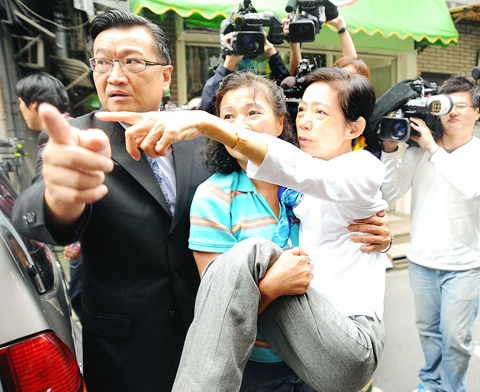The office of former president Chen Shui-bian (陳水扁) yesterday expressed regret over the connection between Chen and a lawsuit filed by Taiwanese activist Roger Lin (林志昇), saying the former president would never meet Lin again or sign any paper he issues.
In a statement issued yesterday, Chen's office said the former president endorsed Lin's lawsuit because he thought it could help clear up Washington's position on Taiwan's status and its Taiwan policy.
It said Chen understood that Lin’s lawsuit had been going on for many years and that it had nothing to do with the former president's legal problems.

PHOTO: CHU PEI-HSIUNG, TAIPEI TIMES
“The connection between Lin's lawsuit and the former president's legal cases has caused Chen much trouble,” the statement said. “The former president feels puzzled and regretful about it. He has decided never to see Mr Lin again or sign any more documents.”
Chen also disagreed with Lin using his name to ask for donations, the statement said.
Lin petitioned a Washington district court in October 2006 to rule on the nationality of the people of Taiwan. He wanted the US court to decide what rights the Taiwanese have under the San Francisco Peace Treaty and the US Constitution, including whether they should be issued US passports.
Lin said the treaty did not address sovereignty over Taiwan and Penghu, and that the US was therefore still the principal occupying power. The court dismissed the case, saying it lacked jurisdiction over political matters.
On appeal, Lin argued that the US was Taiwan’s “principal occupying power,” effectively giving the US temporary de jure sovereignty. When permanent sovereignty is ultimately decided, Lin said, the de jure sovereignty of the US would cease.
The US Court of Appeals in Washington upheld the district court’s ruling that deciding sovereignty was a political task rather than a judicial question. As the executive branch of the US government has remained silent on this issue, the court said, it could not intrude on its decision.
Lin appealed to the US Supreme Court on July 8 this year.
The case took an unusual twist last month when Chen signed an affidavit in support of Lin's lawsuit. In the affidavit, Chen said the US has been the “principal occupying power” of Taiwan and that he would like to clarify in court the relationship between “the people of Taiwan (not the 'exiled Chinese' on Taiwan) and the United States.”
The US Supreme Court declined to hear Lin's case earlier this month.
Separately, Chen petitioned the US Court of Appeals for the Armed Forces late last month after he was sentenced to life imprisonment for corruption.
Chen said in an English declaration he signed that during his eight-year presidency, the US executive branch often made decisions for the people of Taiwan without consulting them. These affected the lives, liberty and property of Taiwanese and the nation's territory.
Under the 1952 San Francisco Peace Treaty, Chen said it is clear that Taiwan was not awarded to the Republic of China and thus remains under the US Military Government until that government is legally supplanted.
Lin, who said his organization was sponsoring the legal action for Chen, demanded Chen's immediate release from incarceration and full respect for Chen's civil rights.
Lin, however, focused on Chen's argument in the affidavit concerning Taiwan's international status and dismissed speculation that the suit was aimed at resolving Chen's legal problems.
The US Court of Appeals for the Armed Forces declined to hear Chen's case a few days after the US Supreme Court rejected Lin's case.

Taiwanese can file complaints with the Tourism Administration to report travel agencies if their activities caused termination of a person’s citizenship, Mainland Affairs Council Minister Chiu Chui-cheng (邱垂正) said yesterday, after a podcaster highlighted a case in which a person’s citizenship was canceled for receiving a single-use Chinese passport to enter Russia. The council is aware of incidents in which people who signed up through Chinese travel agencies for tours of Russia were told they could obtain Russian visas and fast-track border clearance, Chiu told reporters on the sidelines of an event in Taipei. However, the travel agencies actually applied

Japanese footwear brand Onitsuka Tiger today issued a public apology and said it has suspended an employee amid allegations that the staff member discriminated against a Vietnamese customer at its Taipei 101 store. Posting on the social media platform Threads yesterday, a user said that an employee at the store said that “those shoes are very expensive” when her friend, who is a migrant worker from Vietnam, asked for assistance. The employee then ignored her until she asked again, to which she replied: "We don't have a size 37." The post had amassed nearly 26,000 likes and 916 comments as of this

New measures aimed at making Taiwan more attractive to foreign professionals came into effect this month, the National Development Council said yesterday. Among the changes, international students at Taiwanese universities would be able to work in Taiwan without a work permit in the two years after they graduate, explainer materials provided by the council said. In addition, foreign nationals who graduated from one of the world’s top 200 universities within the past five years can also apply for a two-year open work permit. Previously, those graduates would have needed to apply for a work permit using point-based criteria or have a Taiwanese company

The Shilin District Prosecutors’ Office yesterday indicted two Taiwanese and issued a wanted notice for Pete Liu (劉作虎), founder of Shenzhen-based smartphone manufacturer OnePlus Technology Co (萬普拉斯科技), for allegedly contravening the Act Governing Relations Between the People of the Taiwan Area and the Mainland Area (臺灣地區與大陸地區人民關係條例) by poaching 70 engineers in Taiwan. Liu allegedly traveled to Taiwan at the end of 2014 and met with a Taiwanese man surnamed Lin (林) to discuss establishing a mobile software research and development (R&D) team in Taiwan, prosecutors said. Without approval from the government, Lin, following Liu’s instructions, recruited more than 70 software